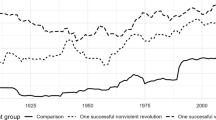Abstract
Goodhart and Lastra (Open Econ Rev 29:49–68, 2018) lay out the mechanisms through which populist political movements may affect central bank independence. This paper provides the first empirical evidence that one aspect commonly attributed to populism, namely national identity politics, has indeed negatively impacted on central bank independence in developing countries. Combining existing datasets on central bank independence and political variables in developing countries, panel regressions are run for a sample of 113 countries during 1975–2012. Results prove robust to various specifications and macroeconomic as well as institutional control variables.



Similar content being viewed by others
Notes
The significance of lagged inflation varies particularly much across the specifications. This is in line with Garriga (2016), who finds that the explanatory power of inflation for CBI is very sensitive to sample choice.
References
Cukierman A (2008) Central bank independence and monetary policymaking institutions – past, present and future. Eur J Polit Econ 24(4):722–736
Cukierman A, Webb SB, Neyapti B (1992) Measuring the independence of central banks and its effect on policy outcome. World Bank Econ Rev 6:353–398
de Haan J, Eijffinger SCW (2018) The politics of central bank independence. In: Congleton R, Grofman B, Voigt S (eds) Oxford handbook of public choice. Oxford University Press, Oxford
Dincer NN, Eichengreen B (2014) Central bank transparency and independence: updates and new measures. Int J Cent Bank 10(1):189–253
Freedman C, Ötker-Robe I (2010) Important elements for inflation targeting for emerging markets, IMF Working Paper 10/113
Garriga AC (2016) Central bank independence in the world: a new data set. Int Interact 42(5):849–868
Goodhart C, Lastra R (2018) Populism and central bank independence. Open Econ Rev 29:49–68
Heenan G, Peter M, Roger S (2006) Implementing inflation targeting: institutional arrangements, target design, and communications, IMF Working Paper 06/278
Inglehart R, Norris P (2016) Trump, Brexit, and the rise of populism: Economic have-nots and cultural backlash, Harvard Kennedy School Faculty Research Working Paper Series RWP16-026
Acknowledgements
This work has benefitted from helpful comments from Deniz Igan, Hiroko Oura, Helene Poirson Ward and Vikram Haksar. I would also like to thank the referee, Charles Goodhart, for his comments on the paper. Tania Mohd Nor provided excellent research assistance.
Author information
Authors and Affiliations
Corresponding author
Ethics declarations
Disclaimer
The views expressed herein are those of the author and should not be attributed to the IMF, its Executive Board, or its management.
Additional information
This comment refers to the article available at https://doi.org/10.1007/s11079-017-9447-y.
Rights and permissions
About this article
Cite this article
Agur, I. Populism and Central Bank Independence: Comment. Open Econ Rev 29, 687–693 (2018). https://doi.org/10.1007/s11079-018-9497-9
Published:
Issue Date:
DOI: https://doi.org/10.1007/s11079-018-9497-9




